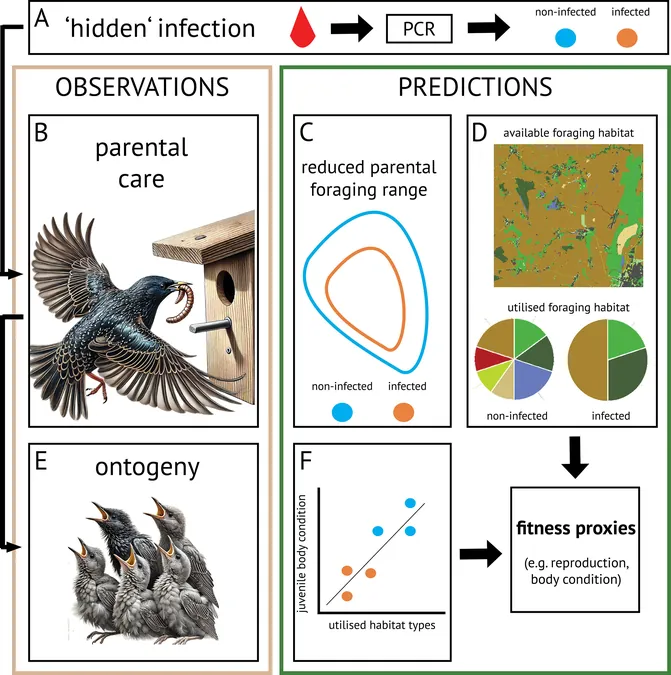
Parasites Put Starlings' Survival at Risk: Shocking New Findings!
2025-04-09
Author: Rajesh
Parasites and Their Hidden Toll on Wildlife
Parasites may be lurking in the shadows, impacting wildlife without any visible signs. Recent research sheds light on how these infections can have dire consequences for future generations of animals. Affected creatures often exhibit slight reductions in body size, and their offspring face significant challenges from birth.
Groundbreaking Study Reveals Starlings at Risk
A dedicated team from the Leibniz Institute for Zoo and Wildlife Research, Technische Universität Berlin, and the University of Potsdam has made a groundbreaking discovery. They revealed that infected starlings significantly limit their foraging range, jeopardizing their reproductive success for the next generation.
Tracking Starlings: The ATLAS System
Using state-of-the-art ATLAS telemetry system, the scientists fitted 29 starlings from two colonies in northeastern Germany with lightweight transmitters. This cutting-edge technology allows for real-time tracking of these birds' movements, providing crucial insights into their behavior and habitat choices.
Startling Results: Offspring Weighing 12% Less!
The findings are alarming: offspring from infected birds weighed, on average, 12% less than those of healthy parent starlings. Apart from reduced foraging efficiency, infected mothers were forced into less favorable feeding grounds, ultimately affecting the well-being of their young.
The Silent Threat: Sub-Clinical Infections
Blood parasites can be deceptive. Infections often manifest without obvious symptoms, leaving wildlife populations to appear unaffected. However, the subtle effects of lethargy and restricted movement can severely limit an animal's foraging success, thereby diminishing reproductive potential.
Understanding the Consequences of Infection
This research is pivotal, as it uncovers the link between health and survival in wildlife. According to study leader Marius Grabow, the research provides robust correlations between infection, action radius, foraging choices, and overall fitness, highlighting the stark reality that even invisible infections pose a formidable threat to species survival.
The Future of Wildlife Research
With the ATLAS tracking system, researchers are acquiring unprecedented insights into animal behavior. Developed by researchers in Israel, this technology is making significant contributions to wildlife studies, allowing scientists to gather accurate data on animal movements and their habitats. Support from the local community has been crucial in setting up this innovative system in the Uckermark district.
As we delve deeper into the impact of parasites on wildlife, these findings underscore the critical need for ongoing research to protect vulnerable species and ensure their survival in our ever-changing environment.


 Brasil (PT)
Brasil (PT)
 Canada (EN)
Canada (EN)
 Chile (ES)
Chile (ES)
 Česko (CS)
Česko (CS)
 대한민국 (KO)
대한민국 (KO)
 España (ES)
España (ES)
 France (FR)
France (FR)
 Hong Kong (EN)
Hong Kong (EN)
 Italia (IT)
Italia (IT)
 日本 (JA)
日本 (JA)
 Magyarország (HU)
Magyarország (HU)
 Norge (NO)
Norge (NO)
 Polska (PL)
Polska (PL)
 Schweiz (DE)
Schweiz (DE)
 Singapore (EN)
Singapore (EN)
 Sverige (SV)
Sverige (SV)
 Suomi (FI)
Suomi (FI)
 Türkiye (TR)
Türkiye (TR)
 الإمارات العربية المتحدة (AR)
الإمارات العربية المتحدة (AR)